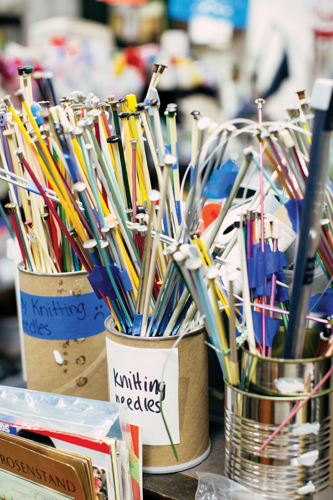
The Good Fill
The Good Fill
East Side-based refill shop The Good Fill helps Nashvillians avoid the use of disposable plastics by offering bath, body and pet products (and more) to be taken home in reusable bottles and other containers. Bring your own glass bottle — or purchase one in the store — and pay by the ounce for shampoo, soap, laundry or dish detergent, all-purpose cleaner and more. The shop also offers eco-friendly products like compostable scrub brushes and organic mesh produce bags.

Turnip Green Creative Reuse
Turnip Green Creative Reuse
Every year, Turnip Green Creative Reuse in Wedgewood-Houston diverts thousands of pounds of discarded materials that otherwise might end up in a landfill. The nonprofit uses these materials for after-school projects and reuse workshops, as well as for stocking its artist marketplace with “handcrafted arts and crafts from local reuse artists.” Visit Turnip Green’s website for details on how to donate or shop for materials and other ways to get involved.
Junkdrop
Junkdrop bills itself as the “most ethical junk-removal solution in Nashville.” The service offers curbside pickup as well as clean-outs for homes, businesses, storage spaces and more, with donated items like appliances, clothes, furniture and construction materials going to those in need. Junkdrop partners with organizations like Habitat for Humanity, Goodwill and the Oasis Center to get donated materials to underprivileged Nashvillians.
Sage Refill Market
Located near the corner of Wedgewood and 12th Avenue South, Sage Refill Market offers “low-waste and package-free options for household cleaning and personal care products.” Sage Refill stocks green products from popular vendors like Tru Earth, Music City Suds and PlantPaper, offering biodegradable cleaners, charcoal compost filters, reusable fabric gift wrap and much more.
RecycleNash
Davidson County doesn’t offer a door-to-door recycling service for glass — and that’s where the folks at RecycleNash come in. The company offers curbside pickup for residents of West Nashville, East Nashville, Belmont, Belle Meade, Brentwood, Hermitage and West End for $10 a month. Glass is estimated to take 1 million years to decompose, but as noted by RecycleNash, it is 100 percent “reusable and recyclable with no loss in purity or quality.”
Bliss and the Trash Plants
instagram.com/blissandthetrashplants
Run by Bliss Cortez, Bliss and the Trash Plants redistributes “abandoned” food and plants to folks in the community who might need them. The group collects overstock and food donations from area farms, gardens and businesses to build grocery and supply kits for people struggling with housing and financing — particularly queer folks and people of color. Cortez is soon relocating to Atlanta, with hopes of establishing another Trash Plants branch there.

Nashville Foodscapes
Nashville Foodscapes endeavors to get more Nashvillians growing their own food — “yard-to-table style.” The company customizes yards and homes, consulting with clients about permaculture principles, water conservation and other earth-friendly methods. As Scene culture editor Erica Ciccarone put it in our 2020 Best of Nashville issue, “By specializing in trees, shrubs, perennials and annuals that produce edible fruits and vegetables, Foodscapes takes a holistic approach to landscaping, reminding us that our relationship with the earth is reciprocal.”
Nashville Tree Foundation
Since 1986, the dendrophiles at local nonprofit the Nashville Tree Foundation have worked to preserve urban forests and identify some of the oldest trees in the county. The group has planted more than 10,000 trees and designated more than 25 arboreta since its inception. Visit the organization’s website to make a donation, sign up for volunteer opportunities or suggest a site for more trees to be planted.
Tri-Star Recycling
As the only e-recycling company in Nashville certified by the R2 Technical Advisory Committee, Tri-Star Recycling manages the ethical disposal of surplus electronics that could otherwise lead to ecological contamination. Having worked with schools, hospitals, tech firms, auto plants and more, Tri-Star notes that improperly handled electronic waste can lead to “chronic illnesses and death to exploited communities overseas when managed unsafely, which is devastating yet preventable.”







